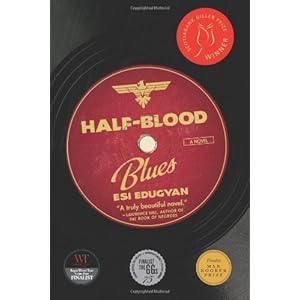Digging into the Canada Reads books has become my winter mission. I started with Esi Edugyan's Half-Blood Blues.
This is a fascinating story that dropped me into a world I didn't know existed and had never even considered: the Jazz scene in Germany during the Nazi regime. It's a complicated emotional portrayal of guilt and regret from a character who was ultimately powerless, but who spends his life blaming himself for what he should have done.
As well-crafted (and well-researched) a novel as it may be, the only thing Canadian about this book is its author. Also, it already won the Giller Prize in 2011 and was a finalist for the GGs and the Man Booker. I kind of feel like this book has already received its public accolades. So while it's a great book, it's not the underdog I'm hoping to cheer for in this year's Canada Reads competition.
Shelagh Rogers did a great interview with Esi Edugyan for her radio show, "The Next Chapter" and it provided some great aural distraction while I did several loads of laundry one day.
After Half-Blood Blues, I decided to tackle The Orenda. I've never read anything by Joseph Boyden, but I feel like his books follow me around. I find them on tables in bookstores with signage like, "The Best Novels You've Never Read." The Orenda has also received a lot of press coverage, so I decided to give it a go.
I was glad I warmed up with Half-Blood Blues: compared to Edugyan's novel, The Orenda is a brick. This novel is narrated by three characters: a Jesuit priest, a Huron warrior, and a young aboriginal woman taken from another village who becomes the warrior's 'adopted' daughter. It was difficult to ease into--kind of like a fast-paced conversation that began without you--but once the narrators' stories began to intertwine, it was difficult to set the book down. (Bonus: You can build some good muscles with this one! It's large, available only in heavy hardcover, and hard to quit!)
A review from Quill and Quire comments on The Orenda's "blockbuster feel," adding, "The Orenda will be this year's Book of Negros, I think." We could definitely do worse for entertaining, Canadian historical fiction!
Entertaining as it may be, it's definitely not fluff. One impactful episode in the novel occurs when the priest loses the wampum that the warrior was to present to another tribe as part of a peace negotiation. He bemoans:
- "I have lost my people's story, my gift to the ones who are our enemy, in the hope of changing that course." (p. 108)
This implies that Canadian history played out the way it did because the stories of certain peoples were lost or dismissed. (Yikes. This entry is starting to sound like a high school essay.)
Where Boyden's novel differs from many of the aboriginal themed/flavoured/inspired novels that I have read (and they are a genre of personal interest...I have read many!) is that the picture he paints of aboriginal history is much more brutal and complicated than the peaceful, idealistic scene that is typical. I will be very interested to hear the commentary that accompanies this novel in the Canada Reads debates. I'm hoping this book makes it to the final rounds because I know it will generate great discussion.
I guess I should stop here. More Canada Reads comments to come.

